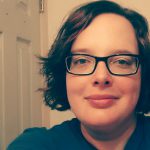
I was grateful to receive a Students and New Professionals Fellowship to attend this year’s Forum. My thanks to CLIR/DLF, the Programming Committee, staff, volunteers, and the original project that inspired me to apply.
I remain thankful for reminders from Chris Bourg and Cecily Walker that the professional is personal is political during the Liberal Arts Pre-Conference, and Oliver Bendorf’s closing session remarks on transition. Their comments were essential to my understanding the DLF community.
Disappearing a conference location is routine; to be welcomed by Musqueam Elder Larry Grant set the tone for many actionable presentations which followed. Vancouver has a long history of vanishing in media, and to have it centered this way is something I hope to see at other conferences.
Other systems librarians I met throughout the Forum discussed the need for value-driven work, the relative dexterity of LACs, and their struggles with assessment in environments with often competing agendas. I heard repeated calls for balancing the humanities in digital humanities, and recognizing shared language to bring more public libraries, community colleges, and other missing voices to the Forum.
Alongside those messages, a continual refrain that our choice of tools, methods, and measures have deep cultural contexts. What we support, how we express support, and what voices are absent showcase our values as clear as any mission statement. Our values must be strategic if we are to succeed in an ever-more outsourced network of library systems. Too often, we place control of powerful systems in the hands of entities which cannot share our ideals, exploit our labor, and drive inequality.
Dr. Safiya Noble’s keynote made me curious about how search bias functioned in my own library and I adjusted several tools during the Forum. I was both troubled and relieved by Dr. Noble’s research, and the way she named a phenomena I’d sensed but could not articulate myself. Matthew Reidsma has taken up this work as well in the context of Summon’s algorithm and Topic Explorer. Jason Clark’s talk on query analysis offered similar structure and guidance for me to work through ideas about user behavior.
To single out one experience at the Forum is difficult. I’m grateful for my mentor, Jason Casden for helping his group of mentees navigate an otherwise overwhelming experience. I had the opportunity to reconnect with colleagues and meet in person people I’ve known for years over social media. Between the fellowship award and the Forum itself, I moved from an R1 to a small liberal arts college. The mental transition from one workplace to another manifested for me during the Forum, as I turned my focus toward undergraduate scholarship projects, data visualization, and usability sessions.
Several session attendees commented on the need for greater collaboration between libraries. I’d suggest those institutions are already collaborating in the ways we need to succeed via their resource sharing departments. I’ve spoken before on the natural but still unrecognized affinities between resource sharing and digital initiatives. As that work is fundamentally about the relationships surrounding scholarly communication, Forum attendees looking to foster those connections should seek out resource sharing practitioners. Our communities are more similar than different, which is perhaps the most significant takeaway I have from Vancouver.
The Forum allowed me to gain footing for this stage of my career, and welcomed me into the community of digital librarians with unexpected kindness. I was challenged intellectually and inspired every day by the work of others; their pain points, successes, and joyous failures. I look forward to Milwaukee in 2016!
